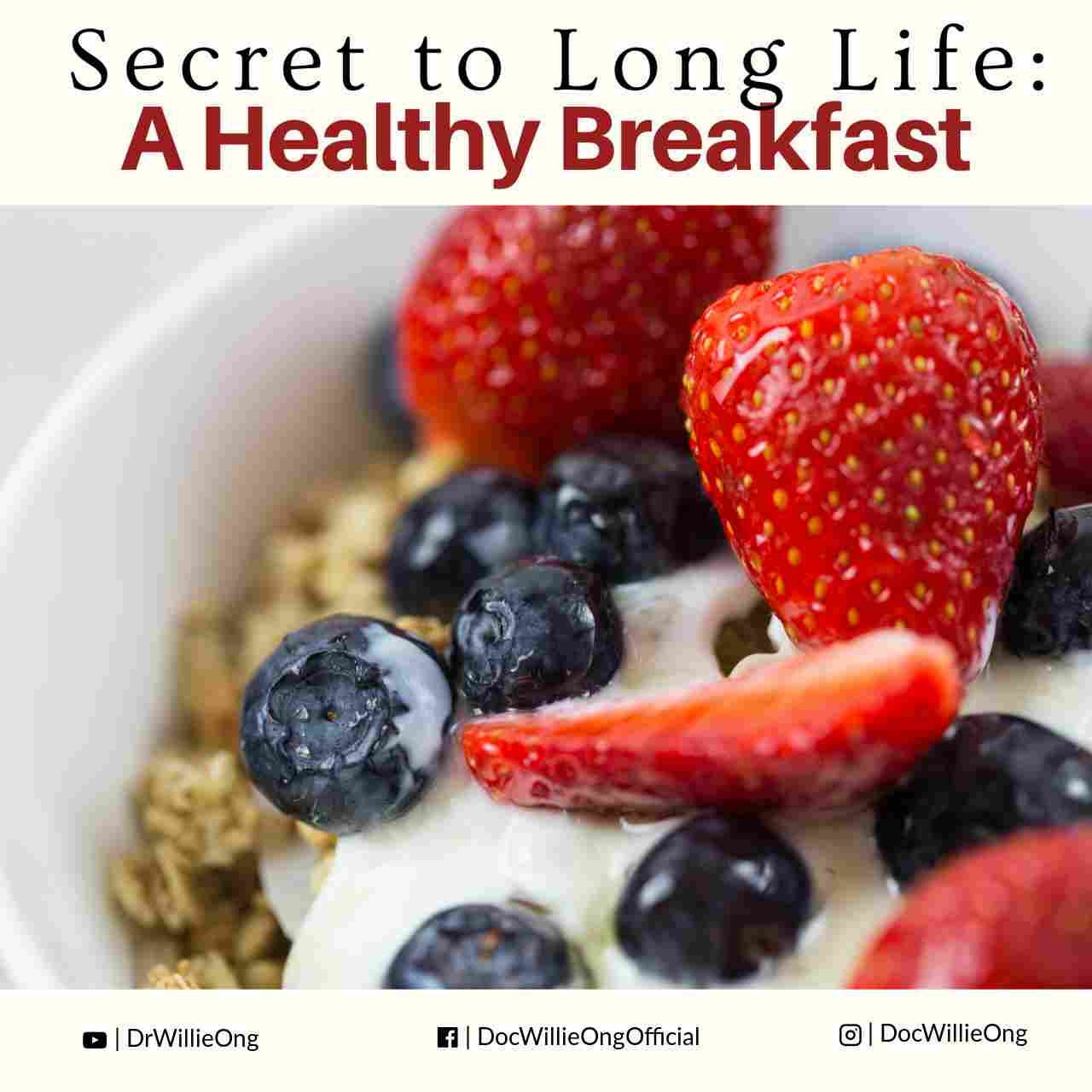Dr. Willie T. Ong (Internist and Cardiologist)
As the age-old saying goes, “Eat breakfast like a king, lunch like a prince, and supper like a pauper.” The American Dietetic Association agrees that breakfast is really the most important meal of the day. You “break the fast”, so to speak, of not eating for the whole night.
If this is so, then how come one out of every three persons doesn’t eat breakfast? Let’s look at the health benefits of eating a healthy breakfast everyday:
- Increases energy.
Just like a car low on fuel, skipping meals causes the body to become sluggish. On the other hand, eating breakfast increases one’s metabolism because the body is burning up the food. Our brain needs fuel, in the form of glucose from food, for it to function properly.
“Eating breakfast is very important for the brain and the body”, says Los Angeles registered dietitian Gail Frank, spokesperson for the American Dietetic Association. “Breakfast skippers often feel tired, restless or irritable in the morning.”
- Lowers cholesterol levels.
According to a study conducted at the University of Nottingham in England, skipping breakfast can lead to an increase in blood LDL levels (the bad cholesterol levels), probably from bad food choices and habits. Conversely, a healthy breakfast rich in soluble fiber (found in oatmeal, citrus fruits, vegetables and strawberries) has been shown to lower cholesterol levels. And lowering your cholesterol levels may prevent a heart attack.
- Helps control weight.
Some people think that skipping breakfast can make them lose weight. This is not true. In fact, eating breakfast can actually help you lose weight. According to dietitian Gail Frank, “Breakfast is also very important for weight loss and weight management.”
Studies have shown that people who eat breakfast tend to eat fewer calories the rest of the day. A 1994 report showed that children who skip breakfast are almost twice as likely to become overweight compared to kids who eat breakfast.
The problem with skipping breakfast is that it causes severe hunger patterns later in the day. This results in overeating on the next meal. Moreover, it’s hard to make a healthy food choice when you’re already starving. Nutrition experts believe that it’s better to eat several small meals a day.
In a survey from the National Weight Control Registry, 80% of dieters who lost 30 pounds or more ate breakfast regularly. Take note that these people ate a healthy breakfast and not one loaded in fats and calories.
- Improves children’s ability to concentrate.
Kids who eat breakfast have gotten higher test score and shown greater ability to concentrate in class. They are also more alert and creative. This finding is not surprising since it’s hard to think straight when your stomach is growling.
- Improves adult’s work performance.
Likewise, adults are better able to perform at work if they have eaten breakfast. Research shows that those who eat breakfast have better concentration, memory, and problem-solving skills than those who skip breakfast. Perhaps, employers should start encouraging their workers to eat breakfast, too.
- May prevent stomach pain and ulcers.
Eating breakfast, more specifically, eating several small meals in a day, can help prevent gastritis and stomach ulcers. One common habit of people with ulcers is the tendency to skip meals. Remember that the food we eat stays in the stomach for around 4 hours only. After which time, the stomach will be empty and will be looking for something to digest. For those with ulcers, take a banana or a piece of bread every 2-3 hours.
- May prolong life.
Dr. Roger Henderson, author of 100 Ways To Live To 100 says, “Researchers recently reported that people who reach the ripe old age of 100 tend to consume breakfast more regularly that those who skip the first meal of the day.”
Dr. Michael Roizen, internist and author, agrees, “Non-breakfast eaters have a mortality rate that is 1.3 to 1.5 times per year higher than those who eat breakfast regularly.”
Eating breakfast also avoids wide swings in your blood sugar from fasting then overeating. A University of Nottingham study finds that those who skip breakfast are more resistant to insulin, making them at risk for diabetes.
How To Choose A Healthy Breakfast:
The benefits of eating breakfast apply only if you choose healthy foods over unhealthy ones. Eating donuts, buttered pastries and fatty meats is not a good way to start the day. It’s high in sugar, fat and calories.
So which foods make up a good breakfast? Actually, your usual choices of healthy foods are acceptable already.
Cereals are good breakfast foods. Several studies show that breakfast cereal (those high in fiber) can play a role in maintaining weight. A Harvard study of more than 17,000 men report that those who frequently eat breakfast cereal consistently weigh less than those who rarely or never eat breakfast cereal.
Eggs are healthy, too. A study from the Journal of the American College of Nutrition shows that eggs can satisfy hunger. The subjects were more satisfied and consumed fewer calories throughout the day, when compared to those who ate a high carbohydrate meal.
But what about the controversial egg yolk and its cholesterol? A large egg contains 75 calories, 6 grams of protein, and 212 mg cholesterol. According to the American Heart Association (AHA), healthy people can eat up to one egg a day.
The healthiest breakfast would, of course, include some fruit on the side, like a banana, an apple or a slice of mango. Other excellent choices are vegetables, yogurt, skim milk and oatmeal. For our protein needs, our local fare of fish (sardines, tilapia and bangus) with a cup of rice will give you plenty of energy.
So, to all our readers who aren’t regular breakfast eaters, let me remind you again that breakfast is the most important meal of the day. It’s the secret to good health, great energy and long life.



